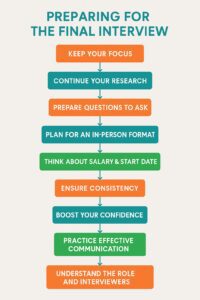Why Final Interviews Are So Important
Why Final Interviews Are So Important
Many job seekers understand the importance of preparation at the beginning of an interview process. They research the company, practice their responses, and present themselves well. Those who fail to prepare usuallydon’t make it past the initial rounds. However, for those who successfully navigate the first and second interviews, the final interview can be the defining moment that determines whether they receive the job offer or not.
So, what can hold someone back from securing the offer after making itthis far? Several key factors can make the difference between being the silver medalist or the gold medalist:
-
Getting Complacent
Thinking you have the job “in the bag” can lead to a lack of enthusiasm or effort in the final interview. Companies want candidates who remain engaged and eager until the very end. Keep the momentum going by treating the final interview with the same energy as the first one. Reiterate your interest in the role, company, and show them why you’re still the best candidate for the position. Not being on your “A” Game during the final interview can make you be perceived as egotistical or over confidant. You haven’t gotten the offer yet so make sure you are continuing to “Wow” your interviewers.
-
Continuing Preparation
The same effort that got you through the initial rounds should be maintained. Researchthe company further, review past discussions, and refine your talking points based on what you have learned throughout the process. Study the company’s latest news, industry trends, and any relevant updates that might impact the role. Rehearse potential questions that might arise based on your previous interviews and be ready to answer them confidently. Practice in front of a mirror this can also help calm your nerves.
-
Have Questions for the Interviewers
Asking insightful questions not only shows interest in the role but also helps determine if the position is the right fit for you. A lack of questions may signal a lack of enthusiasm or curiosity. Prepare at least five meaningful questions that demonstrate your understanding of the company and role. Ask about team dynamics, challenges the department faces, and the company’s future vision. Engaging in this way leaves a positive impression on your interviewers. It’s important for you before accepting an offer that you know the culture, the manager’s leadership style and why the position is vacant. Don’t accept an offer that puts you in the same or worse position than the job you currently have.

-
Not Preparing for the Interview Format
Final interviews are often conducted in person, even if initial rounds were on Zoom. Be prepared for an in-person setting, considering everything from professional attire to body language and interpersonal dynamics. If the interview remains virtual, test your technology beforehand to avoid last-minute issues. In either case, be mindful of your surroundings, maintain good posture, and engage fully with your interviewers. Most connections start in the first 3 minutes which means a smile is worth $1M and could get you the offer.
-
Being Unprepared for Salary or Start Date Discussions
By the final interview, you should be ready to discuss compensation expectations and availability. Hesitation or uncertainty can make you appear unprepared or uninterested. Research salary benchmarks for your role, know your worth, and be ready to negotiate if needed. Make sure you have asked the recruiter or HR Professional the range for the role during the process prior to final interview. Discussing start dates, have a clear and reasonable timeframe in mind, ensuring you’re aligning with the company’s needs. Don’t be afraid to take a week break (if you can afford it) between roles. And prior to start, make sure you get approved already booked vacations!
-
Inconsistency in Your Responses
Employers value consistency in messaging. If your answers or attitude shift between interviews, it may create doubts about your reliability or interest. Review your previous conversations and ensure your statements alignwith what you’ve shared earlier. Keep track of key points you have emphasized and reinforce them consistently to strengthen your candidacy. Your strengths should remain constant throughout the process and to each interviewer. Then when the panel meets they say the same things about you! Keep your answers succinct and emphasizing your background and expertise.
-
Lack of Confidence
Confidence (not arrogance) is crucial. Employers want to hire individuals who believe in their own abilities and can communicate their value clearly. Maintain eye contact, speak with conviction, and highlight your achievements confidently. If you struggle with confidence, practice mock interviews with a mentor or coach to build assurance in your responses. Especially prior to the final interview.
-
Poor Communication Skills
Effective communication is critical at all stages, but especially in the final interview. Articulate your experiences, skills, and motivations clearly and concisely. Be mindful of your tone, pace, and clarity. Avoid rambling or providing overly brief responses. Don’t go down rabbit holes of rambling. Strong communication also includes active listening—engage with your interviewers and provide thoughtful responses to their questions.
-
Not Understanding Who You Are Meeting
Each interviewer plays a different role in the hiring process. Research their background and how the position interacts with them to tailor your responses accordingly. For example, if you’re meeting with a senior executive, focus on how your role contributes to the company’s big-picture goals. If you’re speaking with a potential team member, discuss collaboration, culture and daily responsibilities.
-
Failing to Drive Home Key Points from the Job Description
The final interview is your last chance to emphasize how your skills and experiences align with the job requirements. Be sure to reinforce why you are the best candidate for the role. Revisit the job description, identify key skills and competencies the employer is looking for, and provide concrete examples of how you meet those criteria. Show them that hiring you is the best decision they can make.
Final Thoughts
A final interview is more than just a formality—it is your last opportunity to make a strong, lasting impression. Avoiding these common pitfalls and maintaining a high level of preparation and enthusiasm can set you apart and increase your chances of securing the offer. Treat the final interview as the most important step in the process, and give it your all!
Hiring a coach to help you along the way can spring board you and support you with doing your BEST through the entire process. Interested in discussing? Reach out for a free consultation Jennifer@mycareercalm.com and I can tell you more about my services and success stories. www.mycareercalm.com
